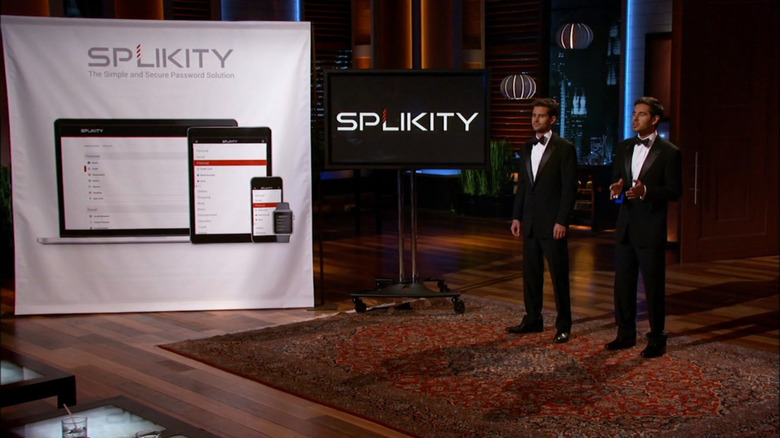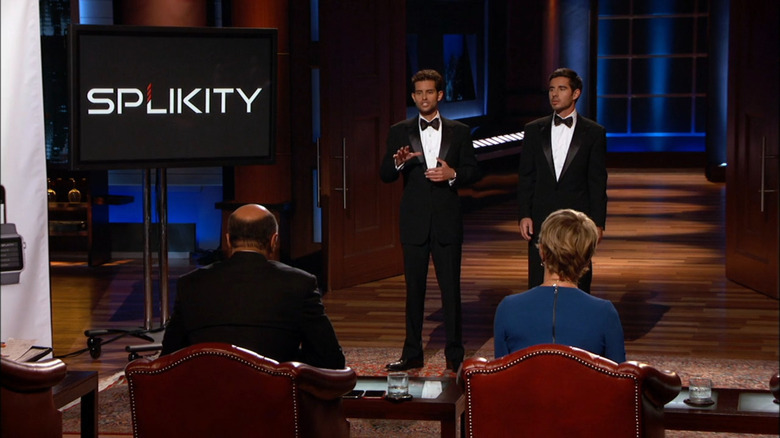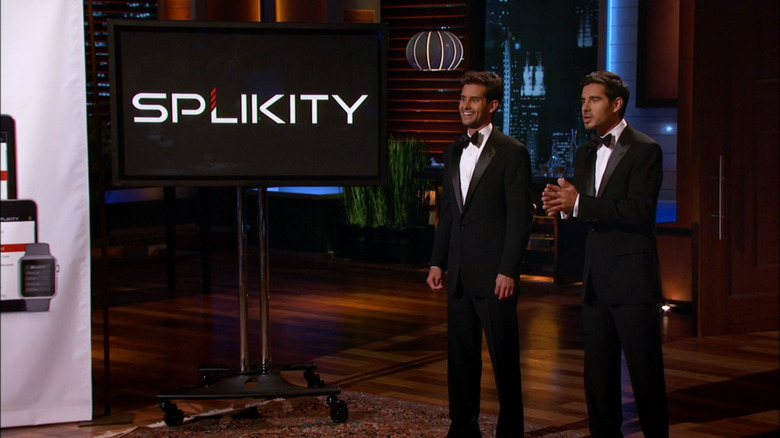What Happened To The Splikity Password App From Shark Tank Season 7?
The second episode of the seventh season of "Shark Tank" premiered on ABC on October 2, 2015 to an audience of 6.82 million viewers, according to Nielsen Media Research. The second of four pitches that week was for Splikity, a secure password manager founded by a pair of brothers from Arizona, Chad and Doug Clark. We strongly recommend using a password manager, although there are better options than Splikity out there. The sharks were skeptical of Splikity for various reasons, primarily the founders' lack of computer science or security backgrounds. They also felt that there wasn't anything to make Splikity stand out from established competition like LastPass and 1Password. The unimpressed sharks offered only a single venture debt deal, which the Clark brothers weren't interested in.
With the Clarks unable to explain what made Splikity stand out from the rest of the pack, the app doesn't appear to have benefitted much from the exposure on "Shark Tank." Though the Clarks claimed that Splikity had a much more friendly user interface than its competitors, it didn't make enough of a difference to matter. Within a few years, Splikity stalled out, and eventually, the app disappeared from the Google Play and Apple stores. Let's take a more detailed look at Splikity's "Shark Tank" appearance and its impact on the Clarks' business.
What happened to Splikity on Shark Tank?
Chad and Doug Clark entered the tank seeking a $200,000 investment for a 20% equity stake in Splikity. At the time, they offered subscriptions for $4.99 per month or $49.99 per year. The Clarks explained that they were living with their parents to put all of their financial energy into Splikity, only for Mark Cuban to quickly ask them what their technology and security background was. As soon as they said that they didn't have one, Cuban opted out, saying they were a prime target for hackers. The Clarks insisted — to no avail — that their team had veteran cybersecurity experts on board.
Lori Greiner had an open mind, and said she could see a market for a password manager with a user interface that appealed more to women. Barbara Corcoran was confused as to what was unique about Splikity, with Robert Herjavec seconding her sentiment by asking for the "special sauce." The Clarks responded that they'd grossed $55,000 in royalties in the previous month via a licensing deal with a security company. Kevin O'Leary was the only shark interested, offering $200,000 as venture debt in exchange for 10% of sales until he made back $600,000 and 5% equity. The Clarks said no, and that was the end of negotiations.
What happened to Splikity after Shark Tank?
In the immediate aftermath of their episode of "Shark Tank" airing on ABC, the Clarks gave an interview to Forbes contributor Rich Winley about their experience on the show. "One of the things we would've tried to get out more is about the whole not having a formal education in computer science," explained one of the brothers — the article doesn't distinguish which. "Some of the most successful companies out there are led by non-technical founders. As long as you have the passion and drive to learn something you can learn it."
They added that though they weren't able to get this point across well during their pitch, their major differentiator from the competition was their emphasis on the user experience. The article ends with an "update" saying that the Clarks were "bootstrapping" Splikity and had been contacted by potential investors since their episode had aired a few weeks earlier. There are no clear indications that Splikity saw a surge in subscribers via the "Shark Tank" effect, nor a hint of which security company the Clarks licensed Splikity to in that 2015 revenue-generating deal.
Is Splikity still in business?
It looks like Splikity is no longer operating. The company's digital footprint outside of "Shark Tank" blogs and its official website is virtually nonexistent, so it's difficult to pin down much in the way of details. The consumer-facing Splikity website is nearly barren, and offers only a login screen with "sign up" and "sign in" links. It gets a lot more grim from there, though. Splikity has never had a significant social media presence as far as we can find, with its official X account having just 58 followers and showing no activity since June 2016. A browser extension is available via the Chrome web store, but is accompanied by the warning, "This extension may soon no longer be supported because it doesn't follow best practices for Chrome extensions." iPhone users can take advantage of Apple's iCloud keychain for password management, and SlashGear recommends these five Android password management apps.
What's next for Splikity's founders?
If we work under the assumption that the March 5, 2019 update to the Splikity App Store page flagged by Google Search was the last time that the signature consumer-facing password manager app was updated, then it looks like there was only one significant update from the company since then. That would be Splikity launching a second website, Splikity.io. This site was geared towards a business-to-business approach, seemingly for pursuing additional licensing opportunities. It carries a 2022 copyright notice, and Wayback Machine caches back up that this is around when the site first went up. It doesn't seem like this went anywhere, though.
The only other trace of Splikity online comes in the form of a LinkedIn profile for Doug Clark (Chad doesn't have a LinkedIn page). Doug's page still lists him as a co-founder of Splikity, but it's pretty bare, so it's hard to tell how current the page is. The profile also lists him as co-founder of a company named LMD Technology, going back to a couple years before he launched Splikity. There's no link to a page explaining what LMD Technology is, though. A CNet download page for the Splikity Opera extension indicates that LMD Technology was simply the parent company for Splikity. As for the Clarks, they seem to have taken their Splikity and split.




